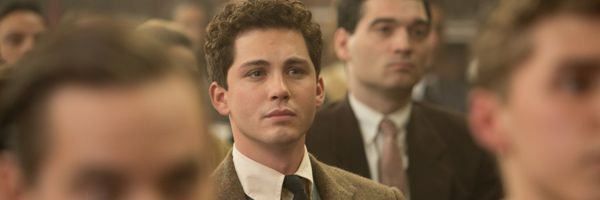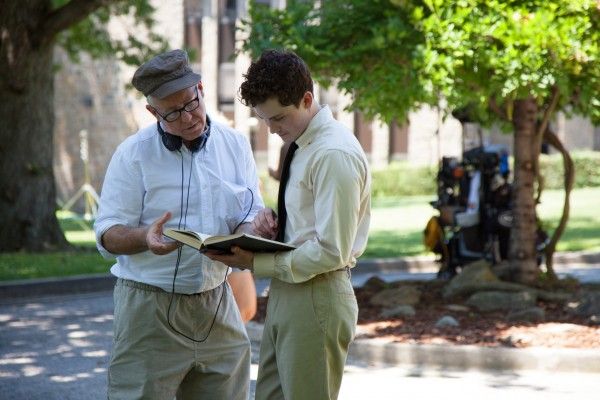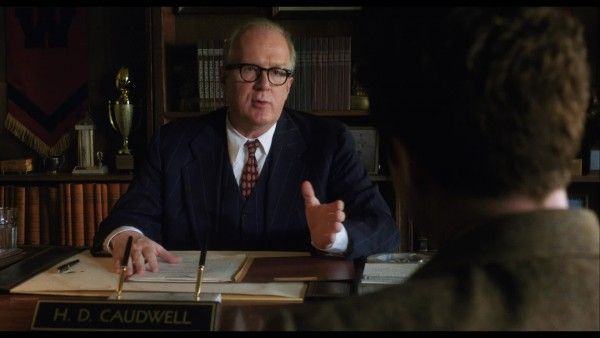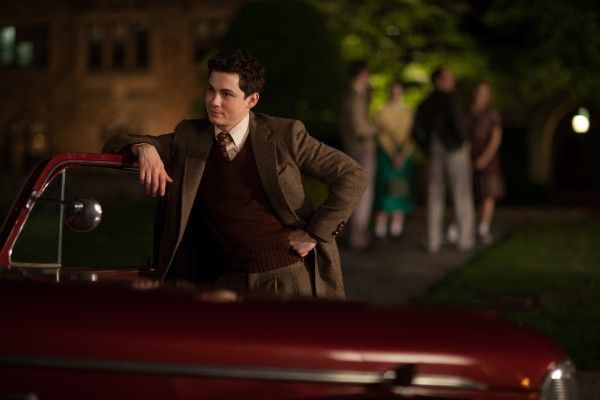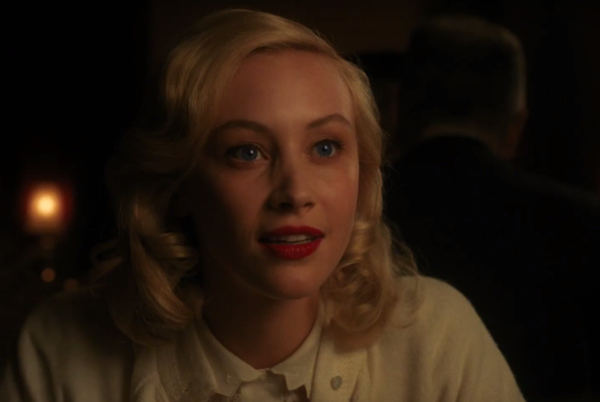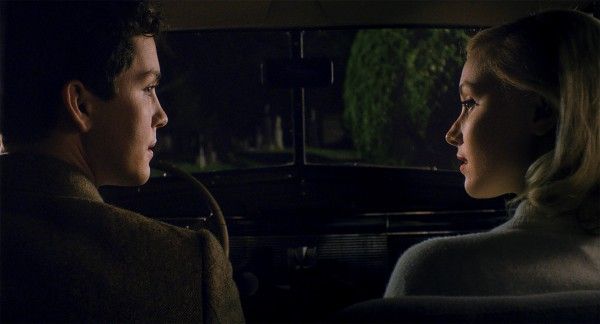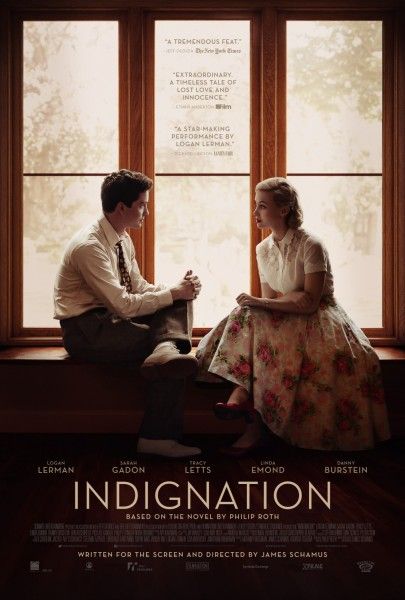While Logan Lerman is only 24 years old, he’s already amassed an impressive filmography chock-full of standout performances. And though he has certainly stretched his talents in films like The Perks of Being a Wallflower or the hardened World War II drama Fury, proving he’s one of the most talented young actors working today, it’s his latest effort, the Philip Roth adaptation Indignation, where he gets to stretch his full range, resulting in his best performance yet.
Written and directed by former Focus Features CEO James Schamus (making his directorial debut), Indignation takes place in the early 1950s and finds Lerman playing a sharp young Jewish man who leaves his New Jersey home to attend a small college in Ohio, where he experiences a sexual awakening after meeting the captivating Olivia (Sarah Gadon) and goes toe-to-toe with the college’s dean over his requirement as a student to attend church.
I caught the film at Sundance back in January and it’s an enthralling, handsome, and somewhat surprising coming-of-age tale that goes a long way towards showcasing Lerman’s talent. After years of penning Ang Lee’s screenplays, Schamus proves to be a formidable director, and while Roth is a tough author to adapt, Indignation does a swell job of capturing the spirit and tone of the novel.
With Indignation opening in select theaters on July 29th, I recently got the chance to speak with Lerman about his experience on the film. The actor discussed his intense preparation process that goes into each and every role, the experience of shooting a centerpiece scene in the film that called for 18-minute continuous takes and long stretches of dialogue, and more. We also discussed (quite heavily) his ultimate aim of eventually directing, and what filmmakers inspire him and what he’s learned from the variety of directors with whom he’s already worked. He also teased his next project, Sidney Hall, for which he also serves as an executive producer.
Check out the full interview below, and if you missed it, click here for my wide-ranging conversation with Schamus.
What were your first conversations with James about the character like? ‘Cause it’s a very complex character and it feels like it might’ve been one that was really tough to nail down.
LOGAN LERMAN: Oh yeah. I mean, the first conversations are even hard to remember because we’ve had so many conversations. Just to recap, I started working on this film fairly early on, about 6 months before filming and had a lot of time to explore this script and the world and do the research and understand it. But James and I had countless conversations and spent countless hours discussing this movie in trying to fully realize what we were making and understand my character, all the characters, and all the decisions that go into organizing the production.
What was your preparation process like for this one? ‘Cause I mean Marcus is supposedly based loosely on Roth himself. So did you dive into Philip Roth or just used the book?
LERMAN: Yeah. Well, like I said, I had a lot of time. I’m not someone who works a lot, and what I mean by that is that I have a project and I focus on it, and I don’t spread myself too thin. I try to give as much as I can to that project, and if we have a lot of time, that’s amazing for me, because I like to really dive deep and do as much as I can. So that said, a lot of times, when I’m approaching pre-production and my job, and trying to research and work on the script and whatnot it’s always different. But in this one, the script was so perfect that I didn’t need to do—there weren't really any conversations about omitting things, or having to rework the character dialogue or anything like that. It was just trying to explore the character and the world, and James made my job very, very easy. A lot of times I’m on my own trying to find research material and things like that and trying to educate myself on the world and the film that I’m working on. But James just handed me materials to read for homework and I just had to follow his list of – he made the research very easy for me. He has a wonderful group of people that he works with. It’s a very well-oiled machines, and anytime I had any questions or any ideas of things that I wanted to do—I wanted to learn how to butcher meat, they set it up immediately and it was all easy for me. They made it very easy for me to just stay curious and explore any ideas that I had. So yeah, I spent a lot of time reading and researching many different aspects of this story.
Your tête–à–tête scene with Tracy Letts is tremendous and it’s kind of like the centerpiece of this film, and I was really surprised when James told me that you guys did that in single takes with no rehearsals. How did you prepare for that as an actor? Not only doing a big scene opposite Tracy Letts, but without rehearsals.
LERMAN: I just wanted to find it. I read the script and I spent about a year trying to find the next role for me, because I take it very seriously. I’m in a position where – I mean, not a lot of people are in a very fortunate position - where I kind of have the power to choose what I want to do in a way. And to find scripts and roles that I really wanna take on almost to define who I am and what my pace is and what I can do as an actor, so this was a great opportunity – this scene in particular to do something different for me, and also to have another interesting character on a list of things to do. I lived with this material for a long time and that scene – I just tried to understand every reference and word, every intention, and I spent hours and hours and hours discussing the scene with James and memorizing Why I Am Not a Christian and doing everything that I can so that on that day, I have the freedom to explore and if I flipped up or if I was forgetting a line or whatever, I could just improvise it, you know? I wanted to get to that point where I could improvise as much. And that said, yeah, when we approached that shooting day, and we were getting closer, James and I realized that we never read it aloud. I’ve never read that scene aloud with another person. I only was reciting the dialogue to my dog at home and looking at myself in the mirror sometimes (laughs).
But if James had any fears about whether or not I was gonna be able to do it justice or perform a scene, he did not show it. He hid his fears well and he just gave me a lot of trust and respect. By the time we got on set it was really nice to know that James didn’t wanna chop it up and have cutting points and say let’s take the scene in chunks. It was exactly what I wanted which was to start from the beginning, start from entering the room, and finish each take with me passing out in my own vomit. So it was great and a wonderful challenge, and really stressful and hard to approach, but at the end of the day I felt fulfilled and really creatively challenged and yeah, it was everything I wanted and more. But luckily, I didn’t fuck up. I don’t know how that happened but anxiety and stress fueled my research for that scene and it ended up working at the end of the day ‘cause we managed to get each take without fucking up. They’re about twenty minute takes each time.
That’s insane. I mean, obviously working with James, first-time filmmaker and he did a tremendous job in this movie, but you strike me as someone who’s interested in the craft and a bunch of different aspects of filmmaking, so I was curious – are you interested in directing at some point? Is that something you’d desire to do?
LERMAN: Yeah. It’s my passion, that’s what I wanna do, it’s the end goal, that’s what I crave every second of the day is to be working on a production but also to be the person leading the production and guiding the pacing of the storytelling. It’s nothing I’m trying to rush into. I’m trying to find who I am and define my filmmaking choices. It’s something that I take seriously. I think that it’s a reflection of – I mean what you choose to do professionally is a reflection of yourself and I take that seriously as an actor. But even as a filmmaker, I take it even more seriously. In that first film that I do, I really want it to be the right one in a really well-thought out decision. So that is the end goal for me, that’s what I really want to do. If I had a script that I was ready to shoot tomorrow, I’d work on it every day until we got into production as soon as possible, but I don’t have that script yet, so I’m trying to find and support writers, really young writers and hopefully come across a story that I wanna tell one day.
Sure. Well I mean you’re already building up a pretty swell roster of filmmakers that you’re working with. You’ve been through the David Ayer experience, Darren Aronofsky, Stepehn Chbosky, and Schamus. Are you kind of taking notes as you’re working with these different filmmakers and seeing their processes? I know David Ayer in particular has a very specific process in how he makes a film and rehearses.
LERMAN: Yeah, it’s very interesting, David’s process. It’s really wonderful. It’s really interesting to observe each filmmaker’s approach to filmmaking and I feel very fortunate to have worked with a lot of really interesting filmmakers and they all approach their job in unique ways. I love learning from the filmmakers that I’m working with, but more importantly, I love learning from the crew. The filmmakers that I studied and appreciated growing up are the ones that are able to dictate their vision clearly to each department, and they know the language of how to communicate with each department well enough, so that their vision is clearly transferred to the screen. So I like to spend time on sets learning from all of the departments and seeing how they approach their jobs. It’s not just filmmakers, you know? There’s so many mediums involved. I love learning about all of the mediums.
Absolutely. Who are some of the filmmakers that influenced you growing up and made you want to dive into this?
LERMAN: There’s so many, but for me, it was 2004 when I fell in love with movies, and funny enough, James Schamus was responsible for that because he took a chance on making Eternal Sunshine of the Spotless Mind – I mean that was also largely Anthony Bregman who also produced this film, who worked for James for many years, and Eternal Sunshine of the Spotless Mind was the movie that was the experience that made me fall in love with films and the power that film can have on an individual. So from that point on, I started studying filmmakers, and I would say early on the ones that really inspired me the most were like the field magicians of music videos. They’re more like magicians than anything, like Spike Jonze and Michel Gondry, you know, the Chris Cunningham box set of music videos and short films they made are the first things I think I really studied and all of their works. And then I went off to Kubrick and all the other wonderful filmmakers and Tarantino and Fincher and all those guys that just really – that’s the original group. That’s where I started and I’ve been studying ever since, really. But I say it really started with that box set in a way. I remember going – like after seeing Eternal Sunshine – I remember getting that – you know that box set that I’m talking about? It was like Palm films or whatever released this three DVD box set. You know what I’m talking about? Have you ever seen that?
Yeah, yeah.
LERMAN: Yeah, it’s wonderful, and that set’s really where it all started and exploring those guys’ approach to filmmaking, which was just so creative and inventive and fun. I loved starting there.
You’re an executive producer on this and I believe you’re also an executive producer on Sidney Hall, which I’m really excited about. What can you tease people about that one? Because it sounds really interesting.
LERMAN: Sidney's great, man. I’m really excited about that one. Shawn Christensen, dude. It’s like he’s the future. A wonderful, wonderful filmmaker and we worked on that project for about a year. Shawn, myself, and Jonathan Schwartz, and we have – I think we made a beautiful film. We shot so much footage and now Shawn is in the editing room trying to figure out which movie he wants to cut together, and I have so much faith in him. But really, it all comes together in the editing room. He’s crafting it right now, molding the film. The story he wants to tell with the footage we shot, so I’m really excited about it. I think we made a beautiful film and there’s some really great people involved so hopefully it turns out to be as good as the experience was, but knock on wood you know.
Yeah, you said you guys shot a lot of footage. Was that on digital or did you guys shoot on film?
LERMAN: No, no, we shot digitally. I would love to shoot on film, but you can’t really shoot a lot of footage on film, and you can’t print a lot of it. I explored the – ‘cause I wanted to really know the answer, because sometimes when you’re exploring early on, when setting up your production you explore the options: do I want to shoot this on film or do I want to shoot it digitally? And so I was able to – I mean on Sidney in particular I was really able to look at the numbers and see why or how much more expensive it would be to shoot this on film. There is a way to do it, but you have to really just print your selects – your select takes – you can’t print everything and that’s not good for filmmaking, because you wanna have as many options as possible and print as much as you can, but if you’re going to shoot a film – an independent movie on film, the only way to really do it is to print your selects and that was an option that didn’t seem like it would help the film very much so we over-shot. We shot a lot of footage and gave so many options for the editing room that it’s almost absurd. We could cut together a hundred different movies out of the footage we shot and I’m so curious what direction Shawn Christensen's gonna go in. He’s a wonderful filmmaker and a very technically proficient filmmaker who knows how to edit – which a lot of filmmakers don’t – which is shocking, I know. You would assume that a filmmaker should know how to edit, but pretty much every filmmaker I’ve worked with doesn’t know how to edit and Shawn is the only I’ve worked with that can actually talk about the programs and discuss how to alter certain things on a very technical level – a very technically proficient level. So Shawn’s a master, he’s gonna go in and I’m sure he’s going to cut together a beautiful film and maybe we’ll be talking about it this time next year or sometime next year, if it gets released.
Nice, well then you’ll have people like Soderbergh who are machines in editing everyday.
LERMAN: Yeah, you see Soderbergh, another one that I’m just like, that’s the type of filmmaker that I grew up admiring, someone who can do it all. That’s a rarity, a true rarity. There are a few filmmakers like that, I feel like Saulnier – Jeremy Saulnier is like that, and you have Fincher and those guys. Tarantino – there’s not a lot of people like that and it really shows you that film is a collection of many mediums and collaboration and you’re only as strong as the people you’re working with – and everybody owns their mediums. You’re not really just a filmmaker that makes a movie good most of the time. It’s everybody involved; it’s a collective effort.

